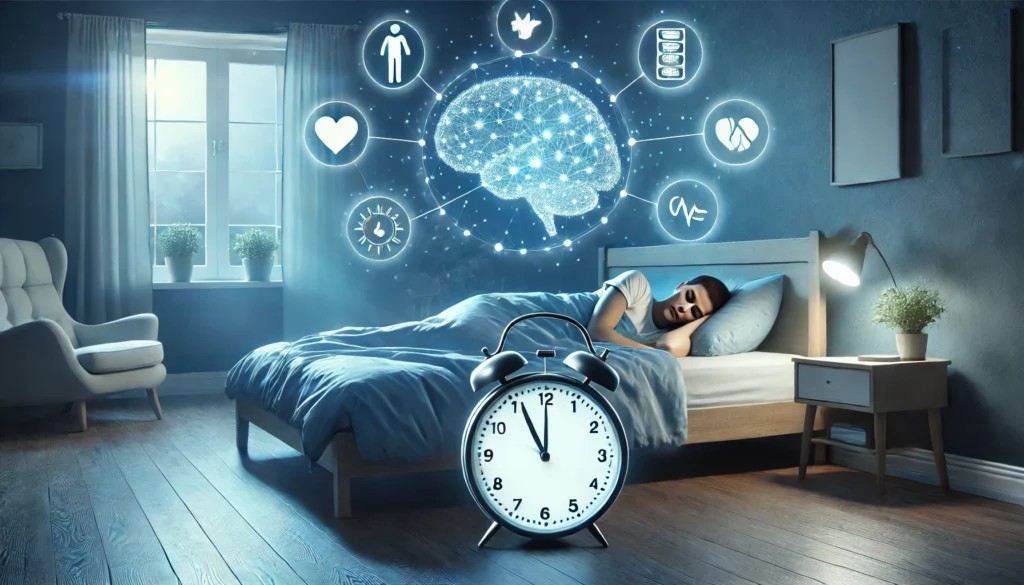In a world that glorifies hustle culture, sleep is often sacrificed at the altar of productivity. But skimping on shut-eye isn’t a badge of honor—it’s a health hazard. A 2024 study by the National Sleep Foundation reveals that 1 in 3 adults fails to get the recommended 7–9 hours of sleep nightly, leading to a cascade of physical, mental, and emotional consequences. Here’s why prioritizing sleep is essential—and how to reclaim your rest.
The Science of Sleep: What Happens When You Rest
Brain Reboot
During sleep, your brain:
- Consolidates memories and learning.
- Flushes out toxins linked to Alzheimer’s.
- Regulates emotions, reducing stress and anxiety.
Body Repair
Sleep is when your body:
- Repairs muscles and tissues.
- Boosts immune function.
- Balances hormones like cortisol (stress) and leptin (hunger).
The High Cost of Sleep Deprivation
By the Numbers
- 40% higher risk of heart disease for those sleeping <6 hours nightly (American Heart Association).
- 50% increased likelihood of obesity due to disrupted hunger hormones.
- $411 billion lost annually in the U.S. due to sleep-deprived workers (Rand Corporation).
Cognitive Consequences
- Memory lapses: Sleep deprivation impairs recall and learning.
- Poor decision-making: Tired brains are more prone to errors.
- Mood swings: Lack of sleep fuels irritability and depression.
Common Sleep Saboteurs
1. Blue Light Overload
Screens emit blue light, which suppresses melatonin, the sleep hormone.
Fix It:
- Use apps like f.lux or enable Night Mode on devices.
- Avoid screens 1–2 hours before bed.
2. Caffeine and Late-Night Eating
Caffeine stays in your system for 6–8 hours, while heavy meals disrupt digestion.
Fix It:
- Cut off caffeine by 2 PM.
- Opt for light snacks like bananas or almonds if hungry at night.
3. Stress and Overthinking
Racing thoughts keep you awake, creating a vicious cycle of sleeplessness.
Fix It:
- Practice mindfulness with apps like Calm or Headspace.
- Write down worries before bed to clear your mind.
How to Build a Sleep-Friendly Routine
Nighttime Rituals
- Set a Schedule: Go to bed and wake up at the same time daily.
- Create a Sleep Sanctuary: Keep your room cool, dark, and quiet.
- Wind Down: Try reading, stretching, or listening to calming music.
☀️ Daytime Habits
- Get Sunlight: Morning light regulates your circadian rhythm.
- Exercise Regularly: Physical activity improves sleep quality—just avoid intense workouts before bed.
- Limit Naps: Keep naps under 20 minutes to avoid grogginess.
Tools to Optimize Your Sleep
| Tool | Purpose | Why It’s Useful |
|---|---|---|
| Sleep Cycle | Smart alarm clock | Wakes you during light sleep phases. |
| White Noise Machines | Block disruptive sounds | Ideal for light sleepers or noisy areas. |
| Oura Ring | Sleep tracker | Monitors sleep stages and offers insights. |
Expert Insights: Why Sleep Matters
“Sleep is the single most effective thing you can do to reset your brain and body health.”
– Matthew Walker, Neuroscientist and Author of Why We Sleep.
“Chronic sleep deprivation is like driving with a blood alcohol level of 0.08%—it’s dangerous and unsustainable.”
– Dr. Rebecca Robbins, Sleep Researcher at Harvard Medical School.
Real-Life Benefits of Better Sleep
1. Improved Productivity
A well-rested brain is 30% more efficient at problem-solving and decision-making.
2. Enhanced Mood
Adequate sleep reduces anxiety and depression symptoms by 40%.
3. Stronger Immunity
Sleeping 7+ hours nightly cuts your risk of catching a cold by 50%.
The Bottom Line
Sleep isn’t a luxury—it’s a biological necessity. By prioritizing rest, you’re not just avoiding health risks; you’re unlocking your full potential. So, tonight, put down your phone, dim the lights, and give your body the gift of sleep. Your future self will thank you.



